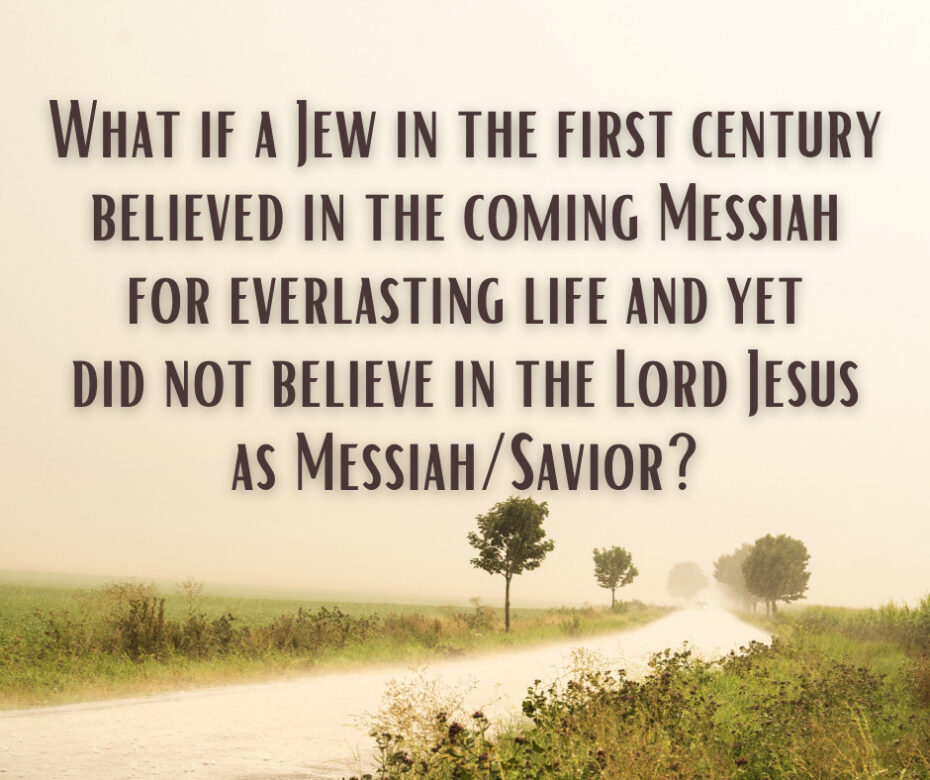At our recent national conference, Colby wrote this excellent question, but there simply was not time to get to it, so I will now:
Did people prior to the introduction of Jesus in Matthew 3:17, who previously believed in the coming Messiah for everlasting life, have to now believe in Jesus who has been revealed as the Messiah? For example, undoubtedly many Pharisees believed in the coming Messiah [for everlasting life], but not in Jesus. But believing in the coming Messiah no longer was sufficient, correct?
There are at least four layers to this question.
First, is it true that many Pharisees believed in the coming Messiah for everlasting life?
Second, is it true that prior to some point in Jesus’ ministry, faith in the coming Messiah for everlasting life was sufficient to be born again? That is, one did not need to know that His name is Jesus until some point in Jesus’ ministry.
Third, what about a person who believed in the coming Messiah for everlasting life and then after he heard Jesus did not believe in Him? Would he be born again?
Fourth, when was the time when saving faith must specifically be in Jesus as the Messiah who guarantees everlasting life?
Let’s discuss those one at a time.
First, if by many Pharisees we mean dozens or even scores of Pharisees, the answer is a clear yes. That is what John says in John 12:42. But it would be wrong to think that hundreds or thousands of Pharisees believed in the coming Messiah for everlasting life. Compare John 5:39-40 and John 6:28-29. They thought in terms of gaining everlasting life by their works, not by faith in the coming Messiah. To believe that the Messiah was coming was not at all the same thing as believing in Him for everlasting life.
Second, there definitely were people in Israel who believed in the coming Messiah for everlasting life and were born again before they knew that Jesus was the Messiah. Simeon and Anna are prime examples (Luke 2:25-38). So is John the Baptist (John 1:32). Of course, those three quickly believed that He is the Messiah. In the case of Simeon and Anna, they believed He was the Messiah when He was but 40-days old. So, yes, prior to some point in Jesus’ ministry, one need not believe specifically in Him for everlasting life.
Third, I think it likely that anyone who believed in the coming Messiah for everlasting life came to believe in Jesus as the Messiah when he became aware of His teachings and His works. However, I suppose it is possible that there were people who believed in the coming Messiah for everlasting life who heard and saw Jesus and yet did not believe in Him. If so, they would still be born again since everlasting life is everlasting. But, as I say, I imagine that God would have convinced such people that Jesus is the Messiah.
Fourth, most dispensationalists suggest that the time when faith had to be specifically in Jesus for everlasting life was from His baptism by John the Baptist forward. Jesus was first revealed to the nation in a major way at His baptism when the Father spoke from heaven and endorsed Him as His Son in whom He was well pleased (Matt 3:17). From that point forward, anyone who had not yet believed in the coming Messiah for everlasting life—which was clearly most of Israel (John 1:11; 5:39-40; 6:28-29; 8:56)—had to believe specifically in Jesus for everlasting life.
Great question, Colby. I hope my answer is helpful.


